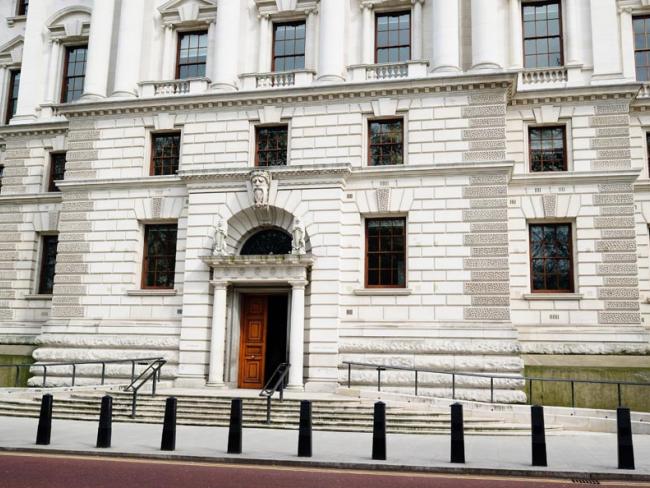
HM Treasury, one of Britain’s oldest, most powerful and most secretive institutions. Photo Workers.
The Treasury is a key part of the capitalist state, and this study provides a fine critique of its operations – despite its reformist conclusions…
Bankruptcy, bubbles and bailouts: The inside history of the Treasury since 1976, by Aeron Davis, paperback, 293 pages, IBN 978-1-5261-5977-9, Manchester University Press, 2022, £16.99.
The Treasury is one of Britain’s oldest, most powerful and most secretive institutions. Its whole history is inseparably bound up with the City of London. Together they have led the centuries long development of capitalism in Britain through to the current domination of finance capital.
The author, Aeron Davis, is Professor of Political Communication at Victoria University of Wellington, New Zealand. He has based his fine book on interviews with over 50 key figures.
The Treasury’s experience and power bend all governments to its purposes. Almost every government for the past 300 years has embraced it. Any government that has tried to resist its domination, even briefly, has been swiftly corrected. It exists to promote particular policies, which it considers the only path to Britain’s success.
But for Britain’s working people there is nothing positive about the Treasury’s record. It enforces the wrong policies on the country. In the 1920s, Churchill said he wanted to see “Finance less proud and industry more content”. But then he obeyed Treasury dogma, and took Britain back onto the Gold Standard, sacrificing industry to finance, leading to the Great Depression.
Adoration
Ever since, Treasury policy has been to make finance more proud and industry less content. It adores the City of London whose word is law, as far as the Treasury is concerned. The result? Ever-lessening growth, stagnant or falling wages, the 2007–2008 crash, falling investment in industrial production, ever-growing debts – all the conditions building for the next crash.
History shows that the Treasury consistently acts against our national industries, against balanced national development, and against central planning of the economy. It promotes huge inequalities of wealth between regions, and opposes skilling up, levelling up. The financial market must decide everything.
‘The Treasury has sabotaged every effort to deliver the independence we voted for…’
At the same time the government is for giving foreign companies incentives to move to Britain – whether through tax breaks, regional development aid, free enterprise zones, or free ports. And it makes it easier to buy, break up, and sell a company here than in any other advanced economy. So, vital companies are sold abroad: jobs, manufacturing capacity, investment, R&D, revenue and profits all go abroad.
This is not neo-liberalism but financialisation – putting finance in command. It imposes botched privatisations, where financial firms snap up almost all the privatised companies’ shares. It backed the mass sell-off of social housing. When council house sales started, it blocked councils from reinvesting the profits and took three-quarters of the profits.
Its policies create vast debts at all levels – individual, corporate, public institutional and local and central government. This has led to rising interest rates which are “catastrophic to an economy now built on such huge debts”.
Since the 2007–2008 crash, we’ve had the lowest rate of corporation tax in the G7 countries, supposedly to increase investment, but it hasn’t worked. The rate of private sector investment, particularly in R&D, is the G7’s lowest. Instead we have higher dividend payments.
Dogmatic
Naturally this dogmatically anti-public spending, anti-industry, anti-protection, anti-planning, anti-national, pro-monetarist, pro-austerity, pro-globalist, pro-finance capital body was, and is, fervently pro-EU. People there were in tears the day after the Brexit vote.
The Treasury, like the Foreign Office, has sabotaged every effort to deliver the independence we voted for. Why has the NI Protocol not been ditched? Because the FO has blocked it. Why is immigration soaring? Because the Treasury believes mass immigration is good for the economy. Davis does acknowledge that Brexit came about partly because working class needs were not met.
Yet, after all this, Davis comes out in defence of the Establishment status quo and Treasury orthodoxy, and writes that “there is much to suggest that no change is best.” He calls the Treasury’s officials “the adults in the room” with “a sense of committed public service”.
Yet these are the same people who Davis admits have always fought public spending, industry, and planning, and supported monetarism, austerity, globalism, capitalism and the capitalist EU.
And what does the Treasury now propose? Austerity, spending cuts, benefit cuts, more devolution, return to the EU and so on.
Indeed, austerity was never about economic sense. It was class warfare, designed to hurt the working class, and to use the global financial crisis as an excuse to shrink the state.
Davis concludes the book by proposing “the devolution of tax and spend powers”, giving substantial financial independence to Scotland, Wales and Northern Ireland, and also to the regions of England. This proposal sounds rather like splitting the Treasury by creating four -– or more – mini-Treasuries.
The book provides a fine critique of the Treasury’s damaging effect on Britain. But its timid reformist conclusion of proposing yet more devolution would worsen, not solve, the problems we face.
The Treasury is part of the capitalist state machine, no more reformable than the EU, or than capitalism itself. A working class that wants to take control of our country must have a different kind of Treasury.
